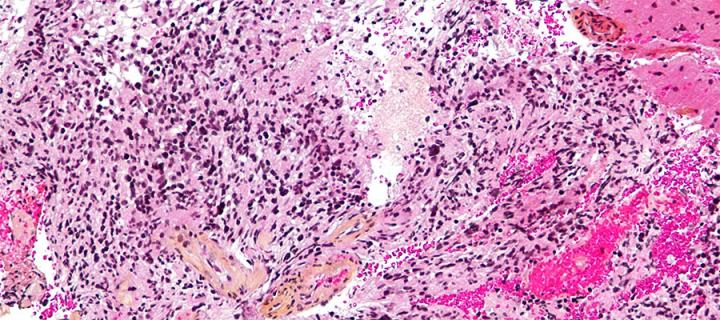Impact of Covid-19 on surgical neuro-oncology multi-disciplinary team decision making
Clinical Research Training Fellow helped assess impact of Covid-19 pandemic on decisions made by surgical neuro-oncology multi-disciplinary teams: August 2020

Michael Poon, a Clinical Research Training Fellow in Edinburgh whose research is supported by the Cancer Research UK Brain Tumour Centre of Excellence Award, contributed to the COVID-CNSMDT study - a national survey that provided insights on the impact of Covid-19 on neurosurgical oncology services.
In the UK adult brain tumours are managed across 30 regional neurosurgical centres, 24 of which are located outside London. All new brain cancer diagnoses are discussed by a multi-disciplinary team (MTD) - a group of health professionals with expert knowledge in the investigation and treatment of patients who may have a tumour in the brain or central nervous system. MDT decides the optimal treatment for each patient, with surgery being the main initial treatment for most patients, but the Covid-19 pandemic has caused an unprecedented threat to healthcare delivery worldwide so it is important to evaluate the impact of Covid-19 on neurosurgical oncology services and to explore differences and variations in MDT decisions compared with the pre-Covid-19 situation. Hopefully this can help improve current situation and provide valuable guidance for the future.
The study, titled “Impact of COVID-19 pandemic on surgical neuro- oncology multi- disciplinary team decision making: a national survey (COVID- CNSMDT Study)” and published in the journal BMJ Open, collected data from 75% UK neurosurgical units outside London for a period between 23 March 2020 and 24 April 2020. It had concluded that Covid-19 has had an impact on patients requiring surgery for malignant brain tumours with 10,7% having a change of management due to Covid-19, most commonly by not having surgery and many having no active treatment at all. The variation of changes in decision making strongly suggests that dedicated cancer operating lists may help to mitigate the pressures of Covid-19.
Related Links:
Article in BMJ Open: https://bmjopen.bmj.com/content/10/8/e040898
CRUK Brain Tumour Centre of Excellence website: https://www.ed.ac.uk/cancer-centre/cruk-brain-tumour-centre-of-excellence
Information about brain tumours: https://www.cancerresearchuk.org/about-cancer/brain-tumours
Information about glioblastoma: https://www.thebraintumourcharity.org/brain-tumour-diagnosis-treatment/types-of-brain-tumour-adult/glioblastoma/
Related Stories:
Longer-term survival analysis in patients with glioblastoma:
Clinical Fellow Acts as Scotland Lead for UK Coronavirus Cancer Monitoring Programme:
Guidelines for treatment of breast cancer patients with delays in surgery due to COVID-19:
Identification of a novel binding site on a SARS-CoV-2 spike glycoprotein:

